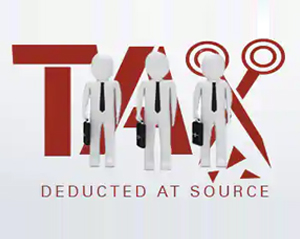What is TDS ?
TDS or tax deducted at source is a deduction made by someone while making a payment or crediting the account, whichever is early. This could be your employer, customer or even a bank paying you interest on a fixed deposit. Before making a payment to you, the payer deducts and pays tax on your behalf to the Income tax department. You can claim/adjust TDS credit while filing your income tax return against income tax payable. You can view the details of the TDS credit in Form 26AS by logging into your income tax efiling account.
TDS could be while purchasing a property, paying rent or paying a salary to any person. In such circumstances, you should know how much tax to deduct (TDS) as well as how and when to pay it to the Income Tax Department. For example, if you are a company/partnership paying professional fees of Rs 60,000, you have to deduct TDS of 10% (see details below). This means Rs 6,000 to be deducted as tax from professional fees. Alternatively, if you have purchased a flat worth Rs 60 lakhs, you have to deduct TDS at 1%. This means you have to keep aside Rs 60,000 and pay this amount to the Income Tax Department rather than to the seller. To know more about when to deduct TDS and how to pay it, is elaborated below
What are the advantages of TDS?
Below is a list of advantages of TDS:
- TDS on salary is an effective way to ensure that people do not evade taxes and pay their dues to the Government of India
- TDS on interest, salary and other sources is a way for the government to earn. It provides a steady source of revenue for the government, which, in turn, benefits the country at large
- With more people included in the tax net through TDS, the tax system becomes more uniform. It promotes equity as a larger section of the population contributes to the government's revenue
- TDS reduces the burden of responsibility on both tax collection agencies and deductors. When tax is deducted at the source, there is no need for the tax collection agencies to follow up, making the process quicker and more efficient
- TDS eliminates the need for individuals to separately calculate and pay their taxes, thereby reducing their load
What are the different types of income sources that qualify for TDS?
- Salary
- Fixed deposit interest
- Bonds
- Insurance commissions
- Contractor services
- Rent
- Shares/Mutual funds
- Savings account interest
- NCDs listed on exchange
- Property
- Brokerage
- Professional and technical services
TDS rate chart
| Income Type | TDS Rate |
|---|---|
| Salary | Slab Rate |
| Fixed Deposit Interest | 10% |
| Bonds | 10% |
| Insurance Commissions | 10%/5% |
| Contractor Services | 1%/2% |
| Rent | 2%/10%/5% |
| Immovable Property | 1% |
| Brokerage | 5% |
| Professional and Technical Services | 10% |
The rates mentioned are for payments made to Resident individuals who have provided their PAN to the person responsible for deducting tax. Different rates apply under the various heads mentioned for specific circumstances and other categories of taxpayers. Please refer to the notes below.
Important dates for TDS payment
The due date for each TDS payment is the 7th of the month following the month in which you have made the deduction. For example if TDS is deducted on 15th January, it must be deposited with the Income Tax Department before 7th February, except in certain cases as specified above. After making payment, you have to file a TDS return. The due date for each TDS return is the last day of the month following the quarter in which TDS has been paid (except for the Jan-March quarter). Have a look at the table below.
| Quarter | TDS Payment Date | TDS Return Date |
|---|---|---|
| Jan – March | 7th Feb, 7th March, 30th April | 31st May |
| April – June | 7th May, 7th June, 7th July | 31st July |
| July – September | 7th August, 7th, September, 7th October | 31st October |
| October - December | 7th November, 7th December, 7th January | 31st January |
What are the different types of TDS return forms?
Form 24Q
Form 24Q is filed by employers to report the TDS deducted from employees' salaries under Section 192 of The Income Tax Act, 1961. This form must be submitted every quarter, with deadlines falling on 31st July, 31st October, 31st January and 31st May for each respective quarter.
Form 26Q
Form 26Q is filed by a payer who has deducted TDS on payments other than salaries, such as interest, dividends and others. It must be submitted every quarter, with due dates of July 31, October 31, January 31 and May 31 for the respective quarters.
Form 26QB
Form 26QB must be filed by any individual or Hindu Undivided Family (HUF) purchasing real estate valued at ₹ 50 lakh or more. The buyer is required to deduct TDS when making the payment to the seller and must submit the form within 30 days from the end of the month in which the tax was deducted.
Form 26QC
Form 26QC specifies the details of tax deducted on rental payments under Section 194-IB of The Income Tax Act, 1961. It must be submitted within 30 days from the end of the month in which the TDS is deducted.
Form 27Q
Form 27Q is filed to report TDS deducted on payments made to foreign nationals and Non-Resident Indians (NRIs), other than salaries. The form must be submitted every quarter, with due dates falling on July 31, October 31, January 31 and May 31 for each respective quarter.
TDS refund
If excess tax is deducted, you will have to claim a refund in your income tax return. For most individuals the return has to be filed by 31st July for the previous financial year.
How to file TDS payment online?
- Login to the NSDL tax payment tax payment website.
- Select Challan no/ ITNS 281.
- Select company or non-company deductee as applicable.
- Enter the Tax Deduction or Collection Account Number and assessment year to which the payment relates. Assessment year is the year which follows the financial year of the transaction
- Now select, whether payment is made by taxpayer for regular assessment.
- Enter the nature of payment, mode of payment and hit ‘submit.’
- If the TAN is valid, the full name of the taxpayer will be displayed on the confirmation screen.
- Once you confirm the data, you will be redirected to your net-banking account.
- Enter the password and OTP/authentication device password and make the payment.
- On payment, a challan will be generated displaying the details of the payment made.
What is a TDS certificate?
A TDS certificate is an official document provided to the deductee. The document acknowledges the amount of tax that has been deducted at the source. There are two primary types of TDS certificates - Form 16 and Form 16A, both mandated by Section 203 of The Income Tax Act, 1961.
- For the salaried class, employers play a crucial role in the issuance of TDS certificates, such as Form 16. Form 16 is a comprehensive document that includes details such as the computation of income tax, the exact amount of tax deducted at the source, and information on TDS payments. Employers are required to furnish Form 16 to their employees before May 31 of the subsequent financial year
- Non-salaried individuals receive Form 16A from deductors. Similar to Form 16, this certificate contains critical information related to the computation of tax, specifics of TDS deductions made by the deductor, and details of payments associated with TDS
COMP/DOC/Apr/2024/24/5796
What are the different types of TDS certificate forms?
Form 16
Form 16 is issued by an employer and provides a summary of the salary earned and the TDS on it. It is specifically meant for salaried individuals and must be issued before 15th June of the following financial year. This form is provided under Section 203 of The Income Tax Act, 1961.
Form 16A
Form 16A is a TDS certificate for income sources other than salary. It applies to TDS deducted from earnings under the head ‘Income other than salary’. It is relevant for professionals and self-employed individuals and is issued under Section 203 of The Income Tax Act, 1961.
Form 16B
Form 16B is provided when TDS is deducted on the sale of immovable property. In this case, the buyer of the property issues Form 16B to the seller as proof that the required TDS has been deducted. This form is issued under Section 194-IA of The Income Tax Act, 1961.
Form 16C
Form 16C shows the amount of TDS deducted from rental payments. When an individual or a Hindu Undivided Family (HUF) pays rent exceeding the specified threshold, they are required to deduct TDS at the rate of 5% and furnish Form 16C. This is issued under Section 194-IB of The Income Tax Act, 1961.
COMP/DOC/Oct/2025/110/1260
* Tax benefits may be available as per prevailing tax laws. Tax benefits under the policy are subject to prevailing conditions and provisions of the Income Tax Act, 1961. Taxes, if any, will be charged extra as per applicable rates. The tax laws are subject to amendments made thereto from time to time. Please consult your tax advisor for details
COMP/DOC/Aug/2020/278/4312
| Our Tax Saving Insurance Plans With Life Cover | |
|---|---|
Tax benefits up to `54,6001 U/S 80C & 80D with | |
Tax benefits up to `46,8003 U/S 80C with | |
|
ULIP ICICI Pru Signature | Check Returns |
Savings Plan ICICI Pru Guaranteed Income For Tomorrow | Check Returns |
| COMP/DOC/Apr/2022/254/0136 | |
People like you also read ...
ICICI Pru Signature UIN: 105L177V03, ICICI Pru Guaranteed Income For Tomorrow UIN: ,







